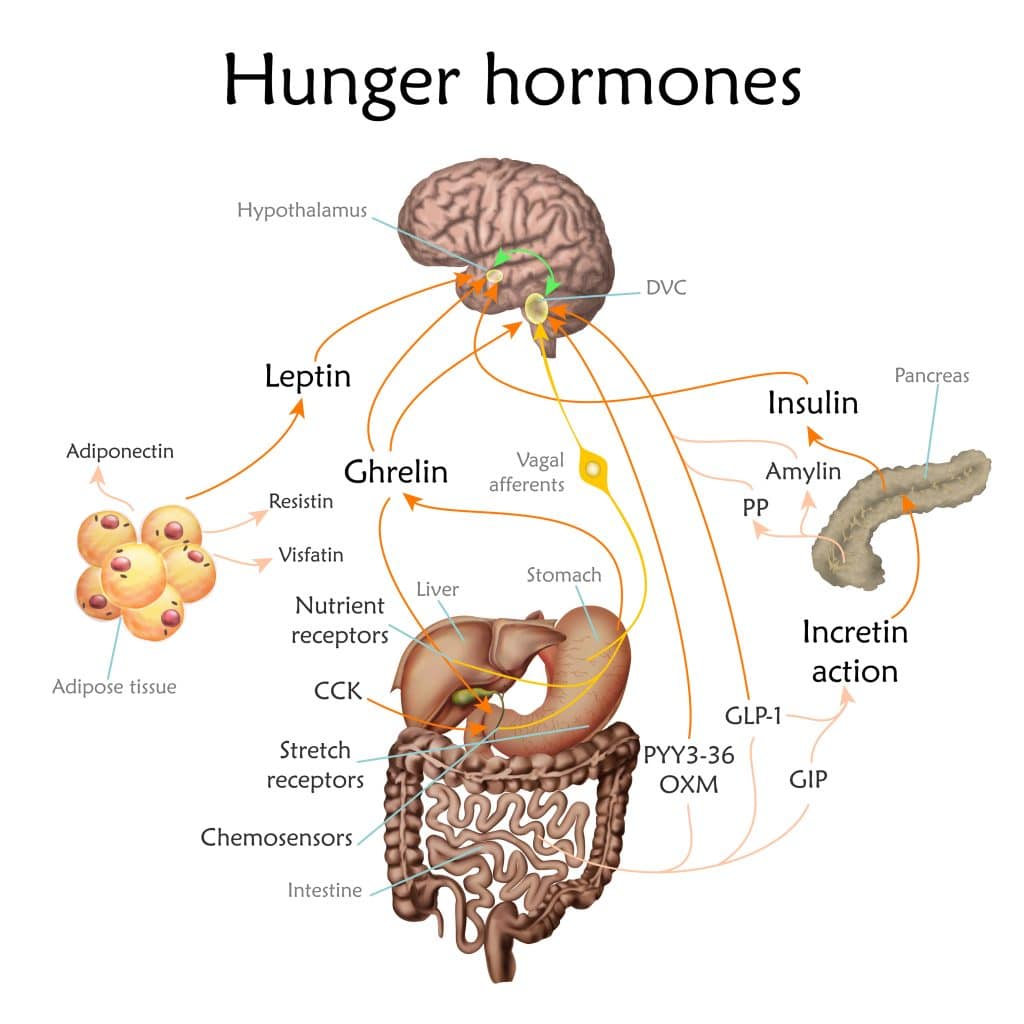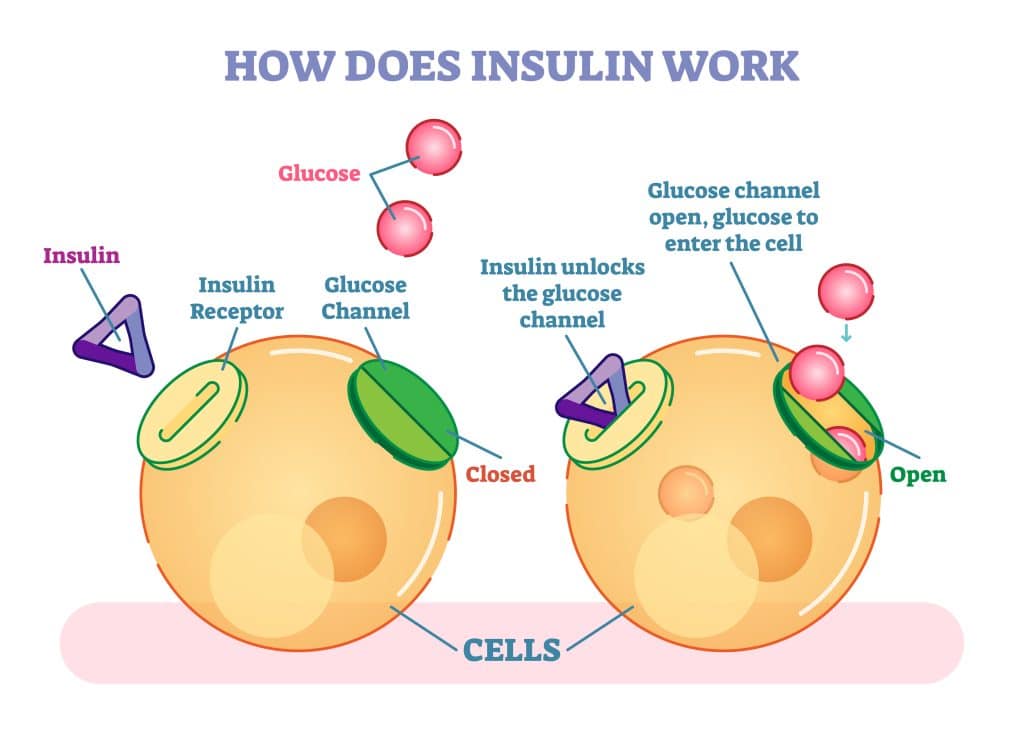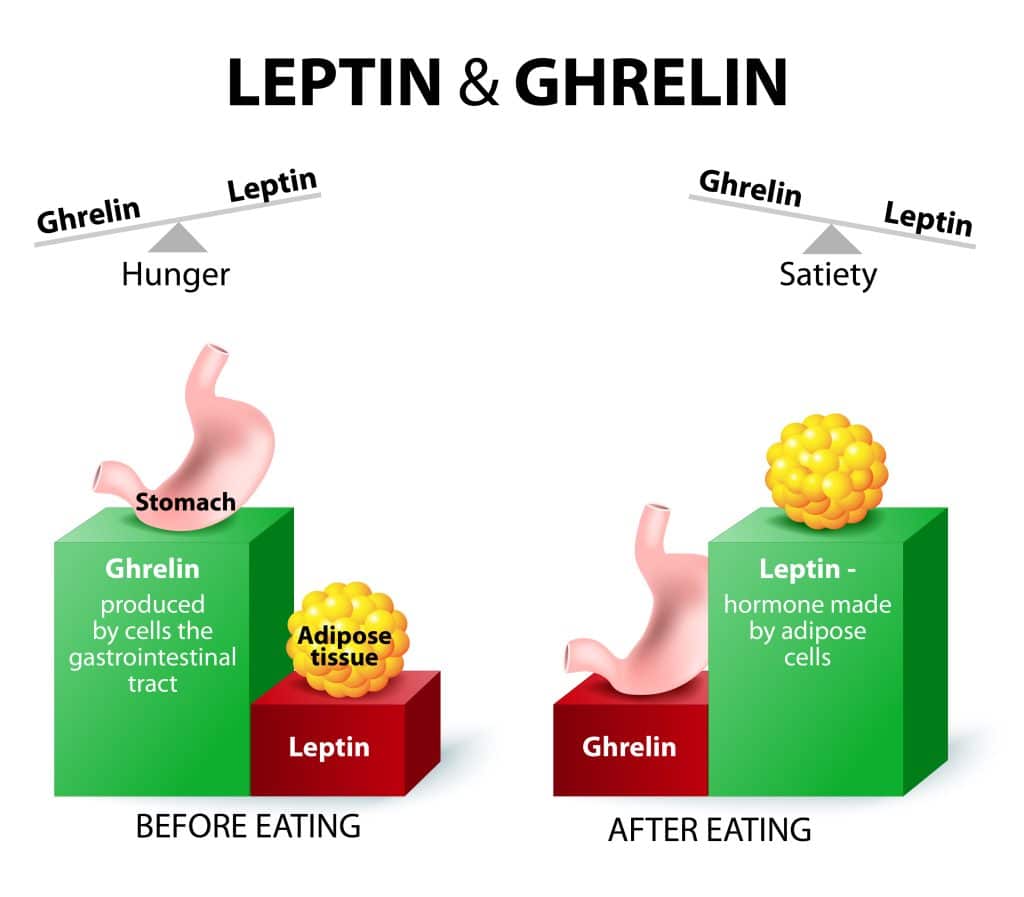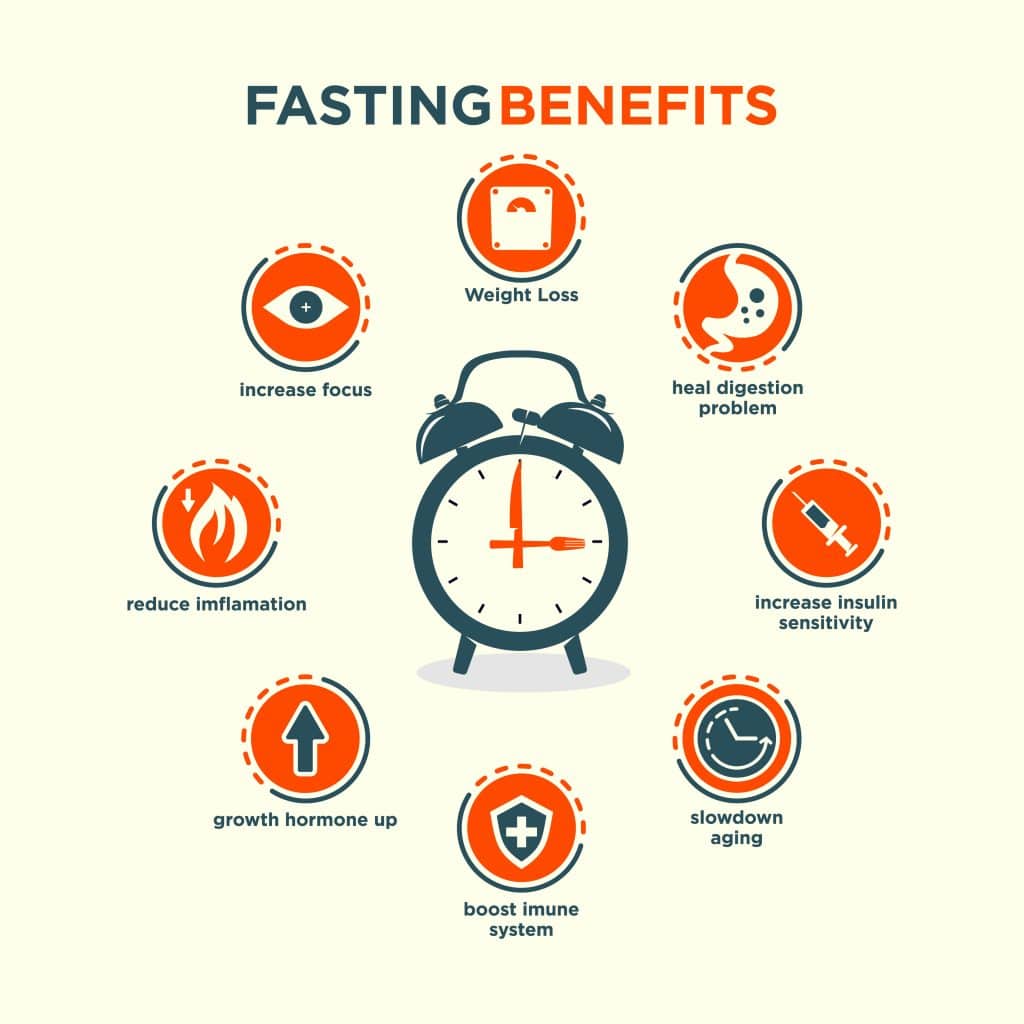Optimizing Fat Loss Hormones – Leptin, Ghrelin, Adiponectin, And Insulin
Optimizing fat loss hormones, specifically, leptin, ghrelin, adiponectin, and insulin, makes losing weight feasible. Leptin is the satiety hormone, stimulating appetite when body fat levels are low and suppressing hunger when adipose tissue contains sufficient fat stores. If leptin is unable to communicate with the hypothalamus, it is known as leptin resistance, which leads to overeating and weight gain.1
Ghrelin is the hunger hormone that stimulates appetite when blood sugar levels are low and suppresses hunger when energy stores are full. Too little ghrelin can lead to weight gain, while too much ghrelin can lead to reduced food intake and decreased body weight.2
Adiponectin is a hormone produced by fat cells, but it has the opposite effect on body weight as leptin, as it increases when losing weight and decreases when gaining weight. This hormone helps regulate metabolism and fatty acid breakdown, meaning it plays an important role in controlling appetite and how efficiently the body burns calories for energy.3
When it comes to fat loss, insulin is one of the most important regulatory hormones. Insulin helps regulate blood sugar and controls how the body uses carbohydrates, proteins, and fats for energy. When levels of insulin are too high, it can lead to weight gain because it causes cells to store more fat.4

Fat Loss Hormones – Leptin
Leptin works by sending signals to the hypothalamus in the brain. This signal tells the body that it is full and no more food should be consumed. It also sends a message to increase metabolism so that calories can be burned faster than they are being consumed.5
Leptin helps regulate how much fat is stored in the body and can help keep the body from becoming overweight. Studies have shown that leptin can help reduce inflammation and improve immune function.6 It also plays a role in controlling blood sugar levels.7
Fat Loss Hormones – Ghrelin
Ghrelin works by binding to receptors in the hypothalamus region of the brain, which is responsible for controlling hunger. This triggers an increased appetite and feelings of hunger.8 Ghrelin increases glucose levels in the bloodstream and stimulates gastric acid production, both of which contribute to digestion. In addition, ghrelin has been found to influence metabolism and energy storage. It can increase glucose uptake in muscles, encourage fat storage in the body, and regulate insulin levels.9
Fat Loss Hormones – Adiponectin
Adiponectin is a hormone produced and secreted by the fat cells of the body. Adiponectin plays an important role in regulating glucose levels and fatty acid breakdown. It works by stimulating the release of insulin, which helps to regulate blood sugar levels, as well as increasing the body’s sensitivity to insulin.
Adiponectin promotes fatty acid breakdown, helping to reduce fat accumulation and improving insulin sensitivity. Adiponectin has beneficial effects on inflammation, cardiovascular health, and other metabolic functions.10
Adiponectin works by stimulating certain receptors on the surface of cells in the body, called AdipoR1 and AdipoR2. These receptors are found in several different tissues throughout the body, including the liver, skeletal muscle, and fat tissue. When these receptors are activated by adiponectin, they cause a cascade of events that result in improved glucose metabolism, increased fat burning, and improved insulin sensitivity. Adiponectin helps to decrease inflammation and improve blood vessel function by activating certain enzymes involved in the synthesis of nitric oxide in the blood vessels.3
In addition to its beneficial effects on metabolic health, adiponectin plays a role in many other physiological processes, such as bone formation and the development of the nervous system.11 12 It is also involved in regulating appetite, energy metabolism, cell growth and differentiation, immune response, and brain function. Adiponectin is one of several hormones that work together to maintain metabolic balance in the body. When its levels are too low or too high it can lead to health problems.13
Fat Loss Hormones – Insulin
Insulin is a hormone that regulates blood sugar and energy utilization. By improving the body’s ability to respond positively to the presence of insulin, fat burning improves while risk factors of metabolic syndromes, such as obesity decrease.14

Read more about metabolic syndrome.
Insulin works by helping the body use sugar from food. It does this by attaching to receptors on cells and signaling them to absorb glucose from the bloodstream. This helps keep blood sugar levels from getting too high or too low, which can cause health complications. Once the glucose is absorbed, insulin helps the cells turn it into energy.
Insulin also helps the body store glucose in the form of glycogen, which is stored in muscles and the liver as an energy reserve. Insulin signals the body to stop breaking down fat cells for energy.15 When there isn’t enough insulin available, these processes are disrupted. Without insulin, glucose cannot be used by the body and builds up in the bloodstream.
Fat Loss Hormones – Leptin Resistance
When leptin is working properly, it tells the brain when we’re hungry or full. However, over time some people may develop what’s known as leptin resistance, meaning their bodies don’t respond properly to the hormone. Leptin resistance can lead to increased hunger, cravings for unhealthy food, and more difficulty in losing weight.16
Research suggests that leptin resistance is caused by chronically elevated levels of leptin in the body due to overeating or diets high in processed carbohydrates. Because leptin signals fullness, our hypothalamus receptors become desensitized to it when constantly bombarded with food, making it difficult to feel full or satisfied. Additionally, the overconsumption of sugar can cause leptin resistance through a process known as glycation, meaning that glucose molecules bind to proteins and other substances in the body, altering their function.17
To address leptin resistance, the first step is to improve diet and exercise habits. Eating a balanced, whole foods-based diet that’s low in sugar and carbohydrates is one of the best ways to reduce leptin resistance. Additionally, regular physical activity has been shown to help reverse leptin resistance by improving insulin sensitivity and reducing inflammation.18
Read more about leptin resistance.

Optimizing Fat Loss Hormones – Reducing Overactive Ghrelin Receptors
People with overactive ghrelin receptors exhibit excessive appetite and food intake that can lead to significant weight gain. Symptoms include intense hunger, increased craving for sweet foods, and inability to feel full after eating. Furthermore, this disorder can lead to psychological issues such as anxiety, depression, and difficulty with food-related decision-making.19
Treatment for overactive ghrelin receptors is largely dependent on lifestyle changes. This includes following a healthy diet and reduced sugar intake. Increased physical activity like walking or biking is also recommended.20
Optimizing Fat Loss Hormones – Increasing Adiponectin Production
Adiponectin levels can be increased through exercise, weight loss, and a healthy diet that is low in carbohydrates and sugars.21 22 Adequate sleep and stress reduction are also important for maintaining adequate adiponectin levels.23 24 Consuming a healthy diet like my Cellular Healing Diet promotes hormone optimization.
Read more about the Cellular Healing Diet.

High levels of adiponectin have been linked to improved insulin sensitivity, increased fatty acid oxidation, decreased inflammation, and reduced risk of developing certain diseases like heart disease. Increasing adiponectin production can therefore be beneficial for optimizing fat-loss hormones and improving overall health.25
Read more about the role inflammation plays in chronic diseases.
Optimizing Fat Loss Hormones – Insulin Resistance
Consuming limited amounts of carbohydrates is a great way to improve insulin sensitivity. Eating a diet high in grass-fed meat, vegetables, nuts, and seeds can also help regulate glucose levels and improve insulin sensitivity.26
Fasting has many benefits, including improved insulin sensitivity. Studies have shown that fasting can improve the body’s response to insulin, meaning it will take less of the hormone to keep glucose levels in a normal range.
Read more about the benefits of fasting.

Exercise improves insulin sensitivity. Engaging in physical activity increases the amount of glucose and fatty acids used by the cells, while also reducing the amount of insulin needed for those processes to occur. As a result, it becomes easier for the body to break down fats and use them for energy, instead of storing them as fat. Additionally, regular exercise can help regulate the body’s stress hormones, which can further enhance the body’s ability to burn fat and regulate metabolism.28
Finally, getting enough sleep is essential for promoting the body’s natural hormone regulation processes. A lack of sleep can lead to an increase in stress hormones, which can disrupt the body’s natural fat-burning and energy utilization systems.29 Aim for 8 hours of quality sleep per night to ensure that hormones are kept balanced and optimized for fat loss.
Optimizing Fat Loss Hormones – Leptin, Ghrelin, Adiponectin, And Insulin
The key to optimizing fat loss hormones like leptin, ghrelin, adiponectin, and insulin all comes down to improving lifestyle choices like exercising and eating a healthy diet. By improving lifestyle choices, one can lose weight as well as reduce their risk of developing chronic diseases.
Read more about how bad sugar is for your health and why it leads to fat gain.
References
1 Allison MB, Myers MG Jr. 20 years of leptin: connecting leptin signaling to biological function. J Endocrinol. 2014 Oct;223(1):T25-35. doi: 10.1530/JOE-14-0404. PMID: 25232147; PMCID: PMC4170570.
2 Ibrahim Abdalla MM. Ghrelin – Physiological Functions and Regulation. Eur Endocrinol. 2015 Aug;11(2):90-95. doi: 10.17925/EE.2015.11.02.90. Epub 2015 Aug 19. PMID: 29632576; PMCID: PMC5819073.
3 Nguyen TMD. Adiponectin: Role in Physiology and Pathophysiology. Int J Prev Med. 2020 Sep 3;11:136. doi: 10.4103/ijpvm.IJPVM_193_20. PMID: 33088464; PMCID: PMC7554603.
4 Templeman NM, Skovsø S, Page MM, Lim GE, Johnson JD. A causal role for hyperinsulinemia in obesity. J Endocrinol. 2017 Mar;232(3):R173-R183. doi: 10.1530/JOE-16-0449. Epub 2017 Jan 4. PMID: 28052999.
5 Kwon O, Kim KW, Kim MS. Leptin signalling pathways in hypothalamic neurons. Cell Mol Life Sci. 2016 Apr;73(7):1457-77. doi: 10.1007/s00018-016-2133-1. Epub 2016 Jan 19. PMID: 26786898.
6 La Cava A. Leptin in inflammation and autoimmunity. Cytokine. 2017 Oct;98:51-58. doi: 10.1016/j.cyto.2016.10.011. PMID: 27916613; PMCID: PMC5453851.
7 D’souza AM, Neumann UH, Glavas MM, Kieffer TJ. The glucoregulatory actions of leptin. Mol Metab. 2017 May 4;6(9):1052-1065. doi: 10.1016/j.molmet.2017.04.011. PMID: 28951828; PMCID: PMC5605734.
8 Tong J, D’Alessio D. Ghrelin and hypothalamic development: too little and too much of a good thing. J Clin Invest. 2015 Feb;125(2):490-2. doi: 10.1172/JCI79187. Epub 2015 Jan 20. PMID: 25607837; PMCID: PMC4319415.
9 Mani BK, Shankar K, Zigman JM. Ghrelin’s Relationship to Blood Glucose. Endocrinology. 2019 May 1;160(5):1247-1261. doi: 10.1210/en.2019-00074. PMID: 30874792; PMCID: PMC6482034.
10 Nigro E, Scudiero O, Monaco ML, Palmieri A, Mazzarella G, Costagliola C, Bianco A, Daniele A. New insight into adiponectin role in obesity and obesity-related diseases. Biomed Res Int. 2014;2014:658913. doi: 10.1155/2014/658913. Epub 2014 Jul 7. PMID: 25110685; PMCID: PMC4109424.
11 Pal China S, Sanyal S, Chattopadhyay N. Adiponectin signaling and its role in bone metabolism. Cytokine. 2018 Dec;112:116-131. doi: 10.1016/j.cyto.2018.06.012. Epub 2018 Jun 22. PMID: 29937410.
12 Bloemer J, Pinky PD, Govindarajulu M, Hong H, Judd R, Amin RH, Moore T, Dhanasekaran M, Reed MN, Suppiramaniam V. Role of Adiponectin in Central Nervous System Disorders. Neural Plast. 2018 Jul 29;2018:4593530. doi: 10.1155/2018/4593530. PMID: 30150999; PMCID: PMC6087588.
13 Yosaee S, Khodadost M, Esteghamati A, Speakman JR, Djafarian K, Bitarafan V, Shidfar F. Adiponectin: An Indicator for Metabolic Syndrome. Iran J Public Health. 2019 Jun;48(6):1106-1115. PMID: 31341853; PMCID: PMC6635323.
14 Rochlani Y, Pothineni NV, Kovelamudi S, Mehta JL. Metabolic syndrome: pathophysiology, management, and modulation by natural compounds. Ther Adv Cardiovasc Dis. 2017 Aug;11(8):215-225. doi: 10.1177/1753944717711379. Epub 2017 Jun 22. PMID: 28639538; PMCID: PMC5933580.
15 Hatting M, Tavares CDJ, Sharabi K, Rines AK, Puigserver P. Insulin regulation of gluconeogenesis. Ann N Y Acad Sci. 2018 Jan;1411(1):21-35. doi: 10.1111/nyas.13435. Epub 2017 Sep 3. PMID: 28868790; PMCID: PMC5927596.
16 Liu J, Yang X, Yu S, Zheng R. The Leptin Resistance. Adv Exp Med Biol. 2018;1090:145-163. doi: 10.1007/978-981-13-1286-1_8. PMID: 30390289.
17 Lustig RH. Childhood obesity: behavioral aberration or biochemical drive? Reinterpreting the First Law of Thermodynamics. Nat Clin Pract Endocrinol Metab. 2006 Aug;2(8):447-58. doi: 10.1038/ncpendmet0220. PMID: 16932334.
18 Boutcher S. H. (2011). High-intensity intermittent exercise and fat loss. Journal of obesity, 2011, 868305. https://doi.org/10.1155/2011/868305
19 Qi Y, Inoue K, Fu M, Inui A, Herzog H. Chronic overproduction of ghrelin in the hypothalamus leads to temporal increase in food intake and body weight. Neuropeptides. 2015 Apr;50:23-8. doi: 10.1016/j.npep.2015.02.002. Epub 2015 Mar 9. PMID: 25801577.
20 Ouerghi N, Feki M, Bragazzi NL, Knechtle B, Hill L, Nikolaidis PT, Bouassida A. Ghrelin Response to Acute and Chronic Exercise: Insights and Implications from a Systematic Review of the Literature. Sports Med. 2021 Nov;51(11):2389-2410. doi: 10.1007/s40279-021-01518-6. Epub 2021 Aug 10. PMID: 34374968; PMCID: PMC8514378.
21 Simpson KA, Singh MA. Effects of exercise on adiponectin: a systematic review. Obesity (Silver Spring). 2008 Feb;16(2):241-56. doi: 10.1038/oby.2007.53. PMID: 18239630.
22 Izadi V, Azadbakht L. Specific dietary patterns and concentrations of adiponectin. J Res Med Sci. 2015 Feb;20(2):178-84. PMID: 25983773; PMCID: PMC4400715.
23 Oliveira RF, Daniele TMDC, Façanha CFS, Forti ACE, Bruin PFC, Bruin VMS. Adiponectin levels and sleep deprivation in patients with endocrine metabolic disorders. Rev Assoc Med Bras (1992). 2018 Dec;64(12):1122-1128. doi: 10.1590/1806-9282.64.12.1122. PMID: 30569989.
24 Oh HJ, Lee S, Park PH. ER stress contributes to autophagy induction by adiponectin in macrophages: Implication in cell survival and suppression of inflammatory response. Cytokine. 2020 Mar;127:154959. doi: 10.1016/j.cyto.2019.154959. Epub 2019 Dec 23. PMID: 31877413.
25 Ziemke F, Mantzoros CS. Adiponectin in insulin resistance: lessons from translational research. Am J Clin Nutr. 2010 Jan;91(1):258S-261S. doi: 10.3945/ajcn.2009.28449C. Epub 2009 Nov 11. PMID: 19906806; PMCID: PMC2793112.
26 Ebbeling CB, Knapp A, Johnson A, Wong JMW, Greco KF, Ma C, Mora S, Ludwig DS. Effects of a low-carbohydrate diet on insulin-resistant dyslipoproteinemia-a randomized controlled feeding trial. Am J Clin Nutr. 2022 Jan 11;115(1):154-162. doi: 10.1093/ajcn/nqab287. Erratum in: Am J Clin Nutr. 2022 Jan 11;115(1):310. PMID: 34582545; PMCID: PMC8755039.
27 Sutton EF, Beyl R, Early KS, Cefalu WT, Ravussin E, Peterson CM. Early Time-Restricted Feeding Improves Insulin Sensitivity, Blood Pressure, and Oxidative Stress Even without Weight Loss in Men with Prediabetes. Cell Metab. 2018 Jun 5;27(6):1212-1221.e3. doi: 10.1016/j.cmet.2018.04.010. Epub 2018 May 10. PMID: 29754952; PMCID: PMC5990470.
28 Richter EA, Sylow L, Hargreaves M. Interactions between insulin and exercise. Biochem J. 2021 Nov 12;478(21):3827-3846. doi: 10.1042/BCJ20210185. PMID: 34751700.
29 Singh T, Ahmed TH, Mohamed N, Elhaj MS, Mohammed Z, Paulsingh CN, Mohamed MB, Khan S. Does Insufficient Sleep Increase the Risk of Developing Insulin Resistance: A Systematic Review. Cureus. 2022 Mar 26;14(3):e23501. doi: 10.7759/cureus.23501. PMID: 35494895; PMCID: PMC9036496.




